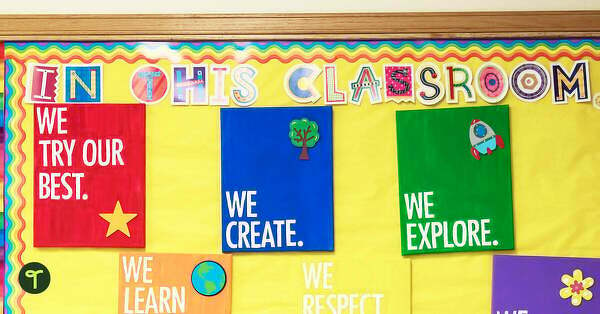To do maths rotations or not?
When you look at the research, there are pros and cons for both sides of the argument. Some people believe it is a waste of time and there is no benefit to their students.
In my experience, I believe that including small group maths rotations in your classroom allows you to work with smaller more targeted groups of students. Providing time for you to provide instruction appropriate to their knowledge.
At the end of the day, it depends on your class, their capabilities, and behaviours. This blog will give you some resources and ideas to plan and manage your maths block.
Maths Block Breakdown
I usually focused on maths in my middle session, approximately 90 minutes. This seems like a long time to focus on maths, especially in the early years, however, that is where rotations fitted in nicely with my explicit teaching and whole class learning!
I allocated 30 minutes to explicit teaching / whole class learning. The students then spent 15-20 minutes at two different stations.
This allowed 20 minutes of cool down time after lunch and for transitions. The next day they completed the other two rotations after more explicit teaching.
Setting Up Maths Rotations
Firstly, you need to decide if you are going to group your students into mixed ability or same ability groups. I found (most of the time) same ability groups allowed me to cater the activities and teacher time to each small group. Then, create a display so the students know what group they are in.
Prior preparation, planning of the display, routines and expectations will allow for a fairly smooth transition into working in small groups.

Next, decide how you will manage each station. I would have one station for me (teacher station). This is where, after my explicit whole class teaching, I would teach a mini-lesson or a guided hands-on activity to consolidate a topic.
If you organise the students into ability groups, you can re-teach the same concept in another hands-on way to your lower ability groups. For your higher ability groups, you can spend time extending on their current knowledge.

I found arranging the resources required at each station into a storage box allowed students to take charge and organise themselves. This eliminated distraction when they got to their stations as their resources were ready to go!

If you have planned different activities for each ability group, simply stick a coloured dot on a plastic folder to help students readily work out which activity is their groups for that rotation.

I used a variety of focused independent activities, collaborative activities and iPad and Computer activities.
Maths Rotations Activity Ideas
So, what do you plan for each station of your maths rotations?
This really depends on the maths topic of the week. My iPad rotation would often be a game to consolidate maths mentals or to revise previously taught topics.
The other three stations were purely dedicated to the maths topic for the week!
Here are some maths topics with possible worksheets and hands-on activities you could use during small group work. For more worksheets and activities for each category, simply click on the heading!
Units of Measurement
[resource:170640][resource:16206][resource:173648][resource:58383][resource:18336][resource:12987][resource:56050][resource:13669]
Money and Financial Mathematics
[resource:70768][resource:61250][resource:61312][resource:4906][resource:18490][resource:13802][resource:12059][resource:58439]
Place Value
[resource:213399][resource:56279][resource:28810][resource:18153][resource:58739][resource:19225][resource:9400][resource:150419]
Operations
[resource:212117][resource:62400][resource:19667][resource:17190][resource:173569][resource:18692][resource:14186][resource:7020]
Patterns and Algebra
[resource:173110][resource:172741][resource:173435][resource:213399]
Shape
[resource:213539][resource:97203][resource:183448][resource:5053][resource:1844][resource:57548][resource:58456][resource:5139]
Chance
[resource:178339][resource:165775][resource:163817][resource:58464]
Location and Transformation
[resource:154729][resource:154696][resource:5212][resource:19738]
Fractions
[resource:57126][resource:57057][resource:57108][resource:54344][resource:19145][resource:24233][resource:24220][resource:53828]
Problem Solving
[resource:21108][resource:21007][resource:12844][resource:12383]








Comments